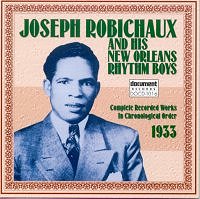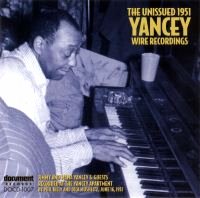
| This ain't no cheese | ||||||||||
Documentary Evidence
JBP discovers a treasure-trove in rural Scotland.
Document Records
The Austrian collector: Johnny Parth, with aid from enthusiasts everywhere, assembled the most complete library of blues, gospel, and associated recordings ever made. These he began to issue from 1990 on his label Document Records. The drawback for customers in Britain was that the material, held in Austria, was difficult to obtain, since efficiency was not the watchword when it came to supply.
During the last few years extraordinary events have taken place. Johnny Parth decided to rest on his laurels and his collection has been acquired by two young enthusiasts and transported to Galloway in South West Scotland. Their catalogue, which runs to well over 100 pages, is a cause for wonder and astonishment. As well as offering the complete recordings of all the blues singers of the 20s and 30s we might expect to find, there are dozens of names unknown to all but the most diligent enquirers, as well as Gospel singers, folk/blues singers, jug bands, pianists and some jazz.
Contact can be made at www.document-records.com.
![]()
JBP Reviews some Document releases...
![]()
Joseph Robichaux And His New Orleans Rhythm Boys. Complete Recorded Works in Chronological Order. 1933.
Document Records. DOCD 1016
Personnel:
Joe Robichaux (piano);
Eugene Ware(trumpet);
Alfred Guichard (clarinet, alto sax);
Gene Porter (tenor sax, clarinet);
Walter Williams (guitar);
Ward Crosby (drums).
Joseph Robichaux was born in New Orleans, and lived there for most of his life, with spasms of jazz action in Chicago and New York (where these tracks were made), or touring in Cuba, Europe and Japan. He played piano in the excellent Jones/Collins Astoria Hot 8, one of the first bands (1929) to be recorded at home in New Orleans.
As a pianist he was a moderniser with a full grasp of New Orleans tradition, and his band played what could be called 'New New Orleans music'. The Rhythm Boys supplied tight, sharp, driving ensemble work, with fierce riffs being interspersed with hard, blazing solos. No trombone, no bass, contrary to New Orleans custom. The rhythm section of piano, guitar and drums creates an astonishing urgency and precision, pounding on like an inspired machine. How do three men achieve this? I don't know; it's positively paranormal.
To listen to these recordings is like standing on a station platform in the days of steam locomotives as a series of express trains piles through without stopping, the stokers stoking the blazing fire with demented zeal.
Robichaux loves fast tempos. Each track goes like this: a few sharp taps on piano wood to set the tempo, and bang, blare, we're off, firing on all cylinders till the band charges past the winning post. One warning: the last three tracks are merely commercial.
The other twenty-one are - well, awesome.
Tunes:
Ring Dem Bells;
St Louis Blues;
Zola;
Foot Scuffle;
King Kong Stomp;
Stormy Weather;
Fish Fry Drag;
Every Tub;
The Riff;
After Me the Sun Goes Down;
Jig Music;
You Keep Me Always Living in Sin;
Sleep;
Falling Star;
I Would Do Anything for You;
Lazy Bones;
Forty-Second Street;
Why Should I Cry for You;
Shake it and Break it(l);
Shake it and Break it(2);
That's How Rhythm Was Born;
Swingy Little Thingy (1);
Swingy Little Thingy(2).
![]()
The Unissued Yancey Wire Recordings. Document Records. DOCD 1007.

Jimmy Yancey was a poet among piano players. He would have been uneasy if you told him so. He had nothing to do with poets. He was a groundsman at a baseball park. From the age of six until age twenty-one he sang and danced in vaudeville, gave that up in 1915 and settled in Chicago. He played the piano at rent-parties but wasn't 'dicovered' by record companies until Meade Lux Lewis recorded his 'Yancey Special’ in 1936.
Yancey could drive at ease through fast tempo boogie - 'Midnight Stomp' - but is at his contemplative best with the haunting waterfalls of chords which we call 'Yancey's Blues' - 'I Received a Letter', 'At the Window'. These pieces are triumphs of profound simplicity.
The photographs of a modest and retiring genius - never a full- time professional pianist - show him seated at the piano in shirt-sleeves wearing an expression of meditative attention and a gentle smile as he explores a way through to the deepest truths of feeling.
He had a limited range of themes, which recur again and again under a variety of titles, but each rendering differs in tempo, mood, modulation, emphasis and magic. There's something inexplicable about Yancey's music; he transforms the chords by playing them.
Document have on three CDs all Yancey's professionally recorded work. The fourth CD is a gift to us all from two student jazz men who made a primitive wire recording of an evening spent at the apartment of the amiable and hospitable Jimmy and his blues-singing wife.
Crowded into their sitting room were two upright pianos and a gathering of in-droppers, each bringing his own bottle, who could join in with the music any time they wanted.
The recording quality is faulty, some tracks are damaged, Yancey didn't play at his best (he died three months later), and the music competes with conversation, varied efforts at accompaniment and occasional encouraging shouts.
There's something moving and endearing about the whole event. On 'Royal Garden Blues' Yancey sings with Mama joining in; Mama sings seriously on 'Hurry Sundown'; one of the students plays modest and pleasant clarinet as backing on several numbers; there's a rousing rendering of 'The Fives' with some unidentified benefactor banging wood blocks together in the hinterland, and the three acetate transfers of previously recorded tracks of 'Chicago in Mind' and 'How Long Blues' do what they can to clarify things.
This CD is not recommended as an introduction to Yancey but as a moving insight into the life and character of the man for enthusiasts, of whom I'm definitely one.
JBP Feb '06
![]()